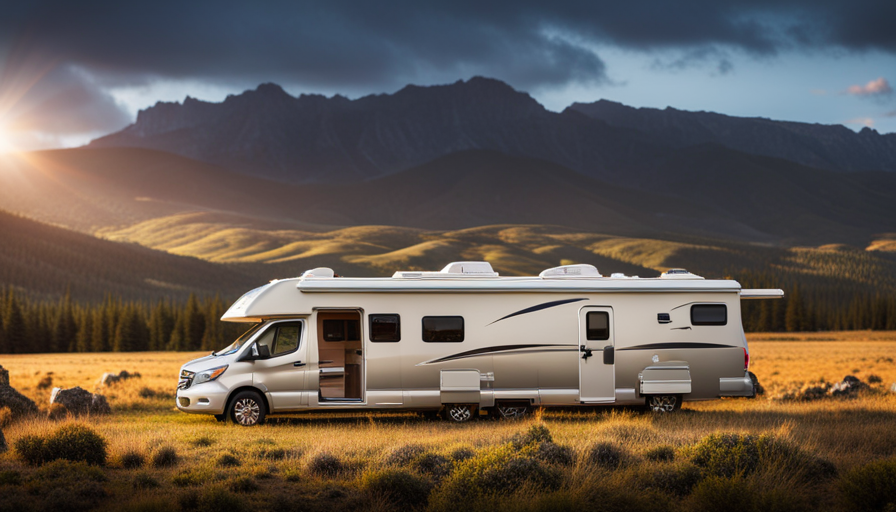Picture this: You’re embarking on a cross-country road trip, immersing yourself in the beauty of nature, and creating lasting memories with your family in your cherished camper. However, everything changes when a sudden accident destroys your camper, leaving you uncertain about the future.
Well, fear not, because we’re here to guide you through the process of dealing with insurance companies when your camper is totaled.
When it comes to assessing the damage, contacting your insurance company is the first step. They will evaluate the extent of the destruction and determine if your camper is a total loss. If it is, you’ll have several compensation options to consider, including a payout or replacing your camper.
While navigating through the insurance claims process, it’s vital to be aware of your loan obligations and seek legal advice if necessary.
In this article, we’ll break down each step of the process, from the initial evaluation to shopping for a new camper. So, let’s dive in and discover what happens when insurance totals your camper. Once you receive the news that your camper has been totaled by insurance, it’s time to start looking for a new one. When shopping for a new camper, take into consideration all the features and amenities that were important to you in your previous one. Once you’ve found the perfect replacement, be sure to ask about tips for camper winterization to protect your investment during the colder months.
Key Takeaways
- Assess the damage and evaluate the options provided by the insurance company when your camper is totaled.
- Consider the compensation options such as cash settlement, replacement camper, or payout for repairs.
- Evaluate the salvage value of the totaled camper and weigh the advantages of retaining possession.
- Communicate with your lender to settle outstanding loans on the camper before making any decisions.
Assessing the Damage
If insurance totals your camper, you’ll need to carefully assess the damage to determine the extent of the loss and the compensation you may be entitled to. Assessing the damage is a crucial step in the insurance evaluation process.
Start by thoroughly inspecting your camper from top to bottom, inside and out. Take note of any visible damages such as dents, scratches, or broken parts. Don’t forget to check the interior as well, including the appliances, furniture, and electrical systems.
It’s also important to document the damage with photographs or videos, as this’ll serve as evidence during the claims process.
After assessing the damage, you’ll need to contact your insurance company to report the incident. Provide them with all the necessary information, including details about the accident, the extent of the damage, and any supporting documentation you’ve collected. Be prepared to answer any additional questions they may have, as they’ll likely want to gather as much information as possible to determine the value of your camper.
By thoroughly assessing the damage and promptly contacting your insurance company, you can ensure a smoother claims process and increase your chances of receiving fair compensation for your totaled camper.
Contacting Your Insurance Company
When contacting your insurance company, you’ll want to promptly report the damage to your camper. This will initiate the claims process and allow the insurance company to assess the damage.
Here are some important things to keep in mind when contacting your insurance company:
-
Gather all relevant information about the damage, including photos, descriptions, and any documentation you have.
-
Be prepared to provide details about the incident that caused the damage, such as the date, time, and location.
-
Have your insurance policy number and contact information readily available.
-
Be clear and concise when explaining the damage to the insurance representative.
By promptly reporting the damage, you can ensure that the insurance evaluation process begins as soon as possible. This evaluation will involve the insurance company assessing the extent of the damage to determine if your camper can be repaired or if it is a total loss.
The subsequent section will delve into the insurance evaluation process in more detail.
Insurance Evaluation
Promptly reporting the damage to your insurance company will initiate an evaluation process to assess the extent of the damage and determine the viability of repairs. Once you contact your insurance provider, they’ll guide you through the necessary steps to evaluate the damage to your camper. This evaluation is crucial as it helps the insurance company determine the compensation options available to you.
During the evaluation process, an insurance adjuster will be assigned to your claim. They’ll assess the damage by inspecting your camper and reviewing any supporting documentation you provide, such as photographs or repair estimates. The adjuster will evaluate the extent of the damage and consider factors such as the age and condition of your camper.
Based on the evaluation, the insurance company will determine the viability of repairs. If the cost of repairs exceeds a certain threshold or if the damage is deemed irreparable, your insurance company may declare your camper a total loss. This means that the cost to repair the camper is more than its current value.
The subsequent section will provide more information on what happens if your insurance company declares your camper a total loss.
Total Loss Declaration
The declaration of a total loss for your camper is determined by the evaluation conducted by your insurance company. They’ll carefully assess the value of your camper based on various factors such as its age, condition, and market value. Once the evaluation is complete, the insurance company will determine if the cost to repair the camper exceeds a certain percentage of its value. If it does, then your camper will be declared a total loss.
When your camper is declared a total loss, you’ll have several insurance coverage options. These options may include receiving a cash settlement for the actual cash value of your camper, purchasing a replacement camper, or receiving compensation for the cost of repairs. It’s important to carefully consider these options and choose the one that best suits your needs and preferences.
In order to understand your compensation options, it’s advisable to consult with your insurance agent or representative. They can provide you with detailed information about each option and guide you through the process. By understanding your options, you can make an informed decision and move forward with the compensation process.
Transition: Now that you’re aware of the insurance coverage options, let’s explore the various compensation options available to you.
Compensation Options
When it comes to compensation options for a totaled camper, there are three key points to consider.
First, you may receive a cash payout based on the actual cash value (ACV) of the camper. This means you’ll be given the current market value of the camper at the time of the loss.
Second, you could explore replacement camper options, which may involve purchasing a similar model or finding a suitable alternative.
Finally, it’s important to factor in the costs associated with replacement campers, such as any price difference or potential upgrades.
Cash payout based on the ACV of the camper
If insurance totals your camper, you can expect a cash payout based on the actual cash value (ACV) of the vehicle, so it’s important to ensure your insurance coverage is sufficient to protect your investment.
When filing a claim, the insurance company will assess the ACV of your camper, taking into account factors such as its age, condition, and market value. Once this evaluation is complete, they will offer you a cash settlement based on that value. It’s important to carefully review the offer and ensure it’s fair and adequate for your needs.
If you accept the cash payout, you’ll have the freedom to use the funds however you see fit, whether it’s towards purchasing a replacement camper or for other purposes.
Moving forward, let’s discuss replacement camper options and their costs.
Replacement camper options and their costs
One option for replacing your camper is to consider the costs of different replacement camper options. When looking for a replacement camper, it’s important to take into account your budget considerations.
There are various options available, ranging from purchasing a brand new camper to buying a used one. Brand new campers offer the advantage of being in perfect condition and often come with warranties, but they can also be quite expensive. On the other hand, buying a used camper can be a more affordable option, but it may come with wear and tear that could require repairs or maintenance.
Additionally, you may want to consider other factors such as the size, features, and amenities of the replacement camper. These considerations will help you find the best replacement camper option that suits your needs and budget.
Transitioning to the next section, it’s also important to evaluate the salvage value and retaining possession of your totaled camper.
Salvage Value and Retaining Possession
In the event that your insurance company declares your camper a total loss, you may have the option to retain possession of it, albeit with a reduced salvage value that can be compared to a bittersweet farewell to a faithful traveling companion.
The salvage value refers to the worth of your camper in its damaged state, which is subtracted from the insurance settlement. This option allows you to keep the camper, but it’s important to consider the costs and benefits.
Retaining possession of your camper can be advantageous if you have a sentimental attachment to it or if you believe you can repair it at a lower cost than its salvage value. However, it’s crucial to understand that the salvage value will be deducted from the insurance settlement you receive. This means that you will have less money to put towards a replacement camper or repairs.
Additionally, keeping a camper with a reduced salvage value may affect your ability to secure financing in the future. Lenders may be hesitant to provide a loan for a camper that has been deemed a total loss by an insurance company. Therefore, it’s important to weigh the salvage value against the potential drawbacks when deciding whether to retain possession of your camper.
Considering these factors, it’s important to carefully assess the salvage value and its implications before making a decision.
Next, we will discuss the considerations related to payoff and loan options for your camper.
Payoff and Loan Considerations
When it comes to the payoff and loan considerations after a total loss of our camper, there are a few key points to keep in mind.
First, we need to make sure to settle any outstanding loans on the camper, as this will affect our financial obligations.
Additionally, it’s important to communicate with our lender about the total loss, as they’ll need to be informed and involved in the process.
Settling any outstanding loans on the camper
To make things easier for you, it’s important to settle any outstanding loans on your camper if it gets totaled by insurance. Here are some payoff options and insurance coverage considerations to keep in mind:
-
Check your insurance policy: Review your insurance policy to understand what coverage you have for a total loss. This will help you determine how much the insurance company will pay towards your outstanding loan balance.
-
Determine the loan balance: Contact your lender to find out the exact amount you owe on the camper. This will give you a clear idea of how much you need to settle.
-
Use insurance payout: If the insurance payout is sufficient to cover the loan balance, you can use it to pay off the loan in full. This will relieve you of any further financial obligation.
-
Seek additional funds: If the insurance payout is not enough to cover the loan balance, you may need to explore other options such as using personal funds or seeking assistance from the lender.
By settling any outstanding loans on your camper, you can avoid complications and move forward smoothly. Communication with your lender about the total loss is the next important step.
Communicating with your lender about the total loss
Make sure you reach out to your lender and inform them about the total loss of your camper, as open communication is key in handling the situation smoothly.
It is important to assess your options and understand how the lender will handle the situation. They may require you to provide documentation of the total loss and may have specific procedures in place for handling these situations.
Additionally, negotiating compensation with your lender may be necessary if the insurance payout doesn’t fully cover the outstanding loan balance. Be prepared to provide any necessary information or documentation to support your case.
Once you’ve communicated with your lender and discussed your options, you can proceed with the insurance claims process smoothly.
Insurance Claims Process
The insurance claims process for a totaled camper can be lengthy, but did you know that on average, it takes three to four weeks to settle a claim?
When you file a claim for a totaled camper, the insurance company will send an adjuster to assess the damage. They will inspect the camper and determine its value based on its condition before the accident.
Once the damage is assessed, the insurance company will provide you with compensation options. These options may include receiving a cash settlement for the value of the camper, getting a replacement camper of similar value, or receiving a payout to cover the cost of repairs. It’s important to thoroughly review these options and consider your needs before making a decision.
After you have chosen a compensation option, the insurance company will work to finalize the settlement. They may require additional documentation or information from you, so be prepared to provide any necessary paperwork promptly.
Once the claim is settled, you can begin shopping for a new camper. Remember to consider your budget, needs, and any lessons learned from the previous incident when making your decision.
Shopping for a New Camper
After going through the insurance claims process and finding out that your camper has been totaled, the next step is to start shopping for a new one.
When it comes to buying a new camper, there are a few things to consider. One option is to buy a used camper, which can often be more affordable than buying brand new. When looking at used campers, it’s important to thoroughly inspect the vehicle for any signs of damage or wear and tear.
Additionally, consider the financing options available to you. Many dealerships offer financing plans that can help make purchasing a new camper more manageable. It’s a good idea to compare interest rates and terms from different lenders to ensure you’re getting the best deal possible.
Once you’ve found the perfect camper and secured financing, it may be beneficial to seek legal advice. This can help protect your interests and ensure that all necessary paperwork is completed correctly.
Transitioning into the next section, seeking legal advice can provide valuable guidance throughout the process of purchasing your new camper.
Seeking Legal Advice
When it’s time to start shopping for a new camper, don’t forget to seek legal advice to ensure you make informed decisions and protect your interests. Seeking legal representation is crucial in navigating the complexities of insurance policies and understanding your rights as a policyholder. Here are a few reasons why seeking legal advice is important:
-
Understanding insurance policies:
- A legal professional can help you interpret the fine print of your insurance policy, ensuring you understand the coverage and limitations.
- They can explain any legal jargon or confusing clauses that may affect your claim.
-
Maximizing your claim:
- With legal guidance, you can ensure that your insurance company fulfills its obligations and provides fair compensation.
- A lawyer can negotiate on your behalf to maximize your claim, considering factors such as the value of your camper, damages, and any lost personal belongings.
Remember, seeking legal advice can help you navigate the claims process smoothly, increasing the likelihood of a favorable outcome. By understanding your insurance policies and having an experienced legal professional on your side, you can make informed decisions and protect your interests when shopping for a new camper.
Frequently Asked Questions
What steps should I take to prevent my camper from being declared a total loss by my insurance company?
To ensure our camper isn’t declared a total loss, we can take some preventive measures. Regular maintenance and inspections can help identify and address potential issues before they become major problems.
Investing in security systems and devices can deter theft and vandalism.
In the unfortunate event that damage does occur, promptly documenting and reporting it to our insurance company is crucial. Providing them with all necessary information and supporting documentation will help maximize our insurance claim.
Can I negotiate with my insurance company to keep my camper even if it is declared a total loss?
We have negotiating options with our insurance company if our camper is declared a total loss. We can explore insurance coverage options that may allow us to keep our camper, even if it’s considered totaled.
It’s important to discuss this possibility with our insurance provider and understand the terms and conditions of our policy. They may offer alternatives such as salvage title or a buyback option, which could allow us to keep our camper.
How does the insurance company determine the salvage value of my camper?
When determining the salvage value of your camper, the insurance company will typically conduct an appraisal. This involves assessing the condition of the camper, considering factors such as age, mileage, and any pre-existing damage.
The appraisal helps determine the value of the camper in its current state, taking into account the cost of repairs and potential resale value. This information is then used to calculate the salvage value, which may be offered to you if your camper is declared a total loss.
Will my insurance company cover the outstanding loan balance if my camper is declared a total loss?
Absolutely! Our insurance policy’s got you covered in every possible way. If your camper’s declared a total loss, we won’t only cover the outstanding loan balance, but we’ll also provide you with a rental camper so you can continue your adventures without any interruption. However, in the unlikely event that our company refuses to pay off your loan balance, we’ve got alternative options available to ensure you’re protected and satisfied with our service. Your peace of mind’s our top priority.
How long does the insurance claims process typically take for a camper?
The insurance claim process for a camper typically takes a few weeks to complete. Our insurance company strives to handle claims efficiently and provide prompt service.
After filing a claim, an adjuster will assess the damage and determine the value of the camper. They will then work with us to settle the claim and provide compensation if necessary.
We understand the importance of a timely resolution and will keep you informed throughout the process.
Conclusion
In conclusion, when your insurance company determines that your camper is a total loss, it can be a challenging and emotional experience. According to recent statistics, it’s estimated that around 25% of all camper insurance claims result in a total loss declaration.
This alarming figure highlights the importance of being prepared for such a situation and understanding the compensation options available to you. Remember to seek legal advice if needed and take your time when shopping for a new camper to ensure you make the best decision for your needs.










